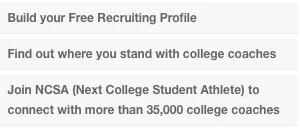Could Concussion Research Impact NCAA Academic Rules
Concussions are one of two major questions facing the NCAA, perhaps an even larger threat than the arguments for employment, unionization, and professionalization of college athletes. The debate over whether to regulate the management of concussions is currently being fought in the courts. Player safety has becoming a highly charged and politicized issue and will continue to be if concussion research continues to add fuel to the demands for more changes to playing rules.
But with the NCAA now considering limiting full-contact football practices, a recent study suggests that concussion management may bleed into more areas of NCAA rules, particularly academic eligibility. Since 2004, medical professionals have recognized the concept of cognitive rest. Beyond simply avoiding more head traumas and resting the body, the brain may need a break from strenuous mental tasks to recover fully from a concussion.
That advice has been based on mostly anecdotal evidence but there might be something more behind the concept:
“The study actually found that athletes doing mild and moderate levels of cognitive activity recovered from a concussion at about the same rate as those doing minimal amounts of activity,” lead author William P. Meehan III, MD, director, Micheli Center for Sports Injury Prevention, and director, Sports Concussion Clinic, Children’s Hospital, Boston, Massachusetts, told Medscape Medical News. “It’s only those doing the highest levels of cognitive activity that tend to draw out their recovery.”
To put that in more statistical terms:
Compared with the approximately 20 to 50 days it took for patients in the lower three quartiles of cognitive activity to recover from symptoms, those in the highest quartile took about 100 days on average to recover.
The study suggests that athletes need not avoid all cognitive work entirely but should avoid the most strenuous cognitive activities. That has lead the following recommendations:
Experts typically recommend that athletes do as little physical and mental activity as possible for the first 3 to 5 days after a concussion, and then gradually increase their level of activity, said Dr. Meehan. “We say, do as much as you can without triggering your symptoms or without making them worse.”
The study results support accommodating students academically. Most schools, at least those in the Boston area, already do try to accommodate student athletes, giving them extra time on tests or a temporary reduction in assignment load where necessary, said Dr. Meehan.
The potential problem for the NCAA is not obvious, but becomes more clear with some examination. Student-athletes are doing college-level work at a full-time course load on top of their athletic commitments. In many cases the athletes are under-prepared for such work, especially in football. Some of the athletes who are most susceptible to brain trauma might be the ones who have to “think hardest” to complete their normal school work.
It would be interesting to know how many institutions practice cognitive rest and provide accommodations for athletes following concussions. The problem for the NCAA would not be in the accommodations themselves, it would be in the potential abuse, coaches asking trainers to diagnose a concussion so an athlete can delay a test or get extra time, then clear the athlete for competition later.
The rule changes to prevent abuse would be fairly simple. An athlete who receives an academic accommodation based on a concussion diagnosis might be ruled ineligible for the next contest for example. The real issue for the NCAA is not this study, it is what following studies might find.
Imagine that follow-up research confirms these findings then go one step further and finds that cognitive rest helps recovery from and reduces the impact of subconcussive impacts. That would be tantamount to a finding that being a football player and a full-time college student are medically incompatible.
The changes required to the NCAA’s continuing eligibility rules could be immense. Most significantly, such a finding could justify allowing athletes in contact sports, especially football, to enroll less than full-time during the season. But that might necessitate changes to credit hour and percentage-of-degree requirements which assume an athlete is passing 12 hours per semester on average. On the other hand, summer school could become more significant and player safety could even be used to support higher initial eligibility standards.
Pac 12 Breakout player-Jacob Alsadek.
That might be years of research away but shorter term impacts are likely. It will not be long before the NCAA is sued over the effect its academic eligibility rules have on concussion recovery. And expect to hear about student-athletes requesting progress-toward-degree waivers or accommodations based on the need to rest their minds following a concussion. If the concussion crisis continues to grow, there is no end to what rules might become battlegrounds over athlete safety.
Auburn University Sports Recruiting.


